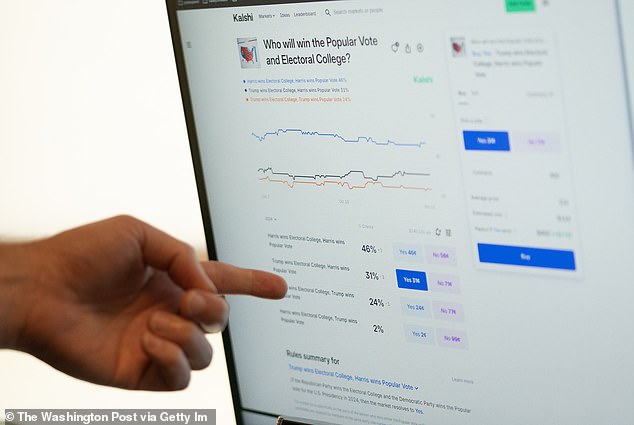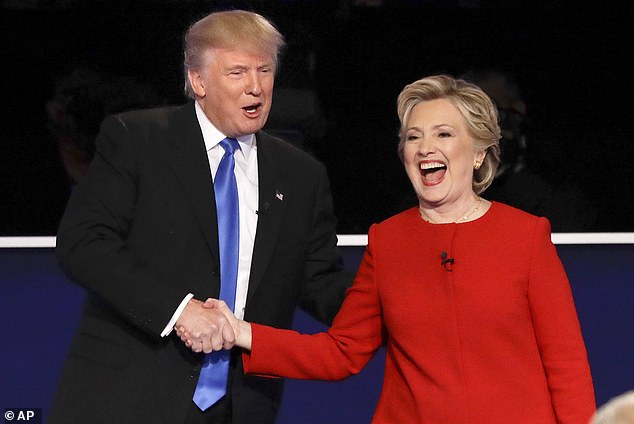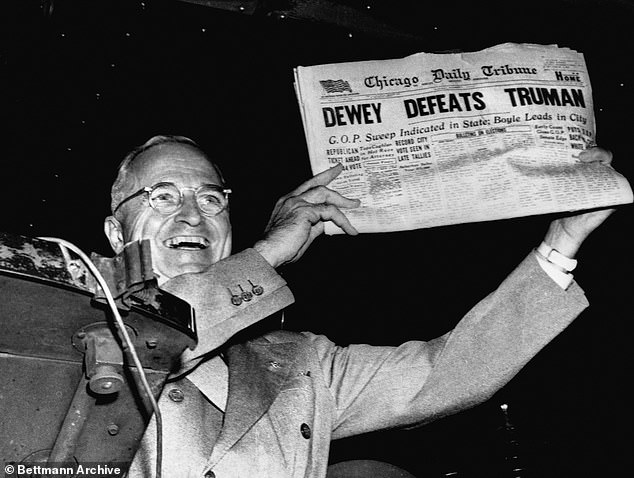Kamala Harris takes the lead over Donald Trump in a betting market for the first time
Kamala Harris’ chances of winning the 2024 presidential election are now higher than Donald Trump’s, according to an online prediction market.
With just three days until what could be one of the closest elections in history, the vice president has surpassed the Republican candidate on PredictIt.
The platform lets users share trades on the outcomes of financial and political events and is considered one of the most reliable in determining the outcome of this year’s race.
On Saturday morning, shares in Harris were trading at 53 cents, while Trump was at 52 cents. On October 29, his lead on the site was 14 points.
Trump is still ahead of other prominent oddsmakers such as Kalshi and Polymarket.
Kamala Harris’ chances of winning the 2024 presidential election are now higher than Donald Trump’s, according to an online prediction market
But Harris has managed to close the gap, showing that her fortunes may have changed in recent days after a strong push from Trump in late October.
In Real Clear Politics’ average betting odds, Trump was ahead by nearly 18 points on Saturday morning.
Meanwhile, on Polymarket, Trump’s odds of winning fell from 67 percent on October 30 to 59 percent on Friday afternoon.
In the same period – October 29 to November 1 – Trump’s odds on both bookmakers Bet365 and Paddy Power fell from 66.7 percent to 63.6 percent.
Kalshi still had Trump with a better chance of winning five of the seven key battleground states: Arizona, Georgia, Nevada, North Carolina and Pennsylvania.
But it gives Harris a better chance in Michigan and Wisconsin.
Pennsylvania is very close with Trump at 52 percent and Harris at 48 percent as of Friday afternoon.
According to the Real Clear Politics betting markets average, Trump still led Harris 60.6 percent to 38.1 percent.
Earlier this week, however, the Republican candidate was at 63.9 percent.
The polls have the election close to a close and essentially tied, but the betting markets have consistently given Trump a clear advantage for weeks.
It was unclear what caused the shift in the gambling markets in recent days.
On October 27, a comedian made a disparaging joke about Puerto Rico at Trump’s rally at Madison Square Garden in New York, sparking widespread backlash.
Kalshi, America’s first legal online betting platform for election predictions, has already placed $92 million in bets on the 2024 race.

A gambler makes a decision about the election
This week, Tarek Mansour, the CEO, said bettors are a more accurate indicator of the outcome than the polls because they have “skin in the game.”
He told DailyMail.com: ‘We certainly have to rely on the [wagering] markets.
“Prediction markets are places where people have money on the line. People don’t lie with their money.’
In 2016, polls indicated that Hillary Clinton would easily beat Trump, but they were wrong.
In the past, betting markets have proven successful in predicting the outcome of elections.
But like the polls, they were not a good indicator in 2016.

Republican presidential candidate Donald Trump and Democratic presidential candidate Hillary Clinton shake hands after the presidential debate in Hempstead, NY, September 26, 2016

the betting markets were wrong in 1948 when President Harry S. Truman won; Here he cheerfully displays a premature early edition of the Chicago Daily Tribune from his train in St. Louis, Missouri, after his defeat of Thomas E. Dewey
As early as 1924, the Wall Street Journal wrote, “Betting is generally regarded as the best indicator of likely results in presidential campaigns.”
According to the newspaper, bookmakers at the time sent people to candidates’ speeches and based their odds on the audience’s reaction.
According to a study by economists Paul Rhode and Koleman Strumpf, in the fifteen presidential elections from 1884 to 1940, there was only one upset when the bookmakers were wrong.
In 1948, however, the betting markets, like the polls, were spectacularly wrong when they gave President Harry Truman only about a one-in-ten chance of winning.
